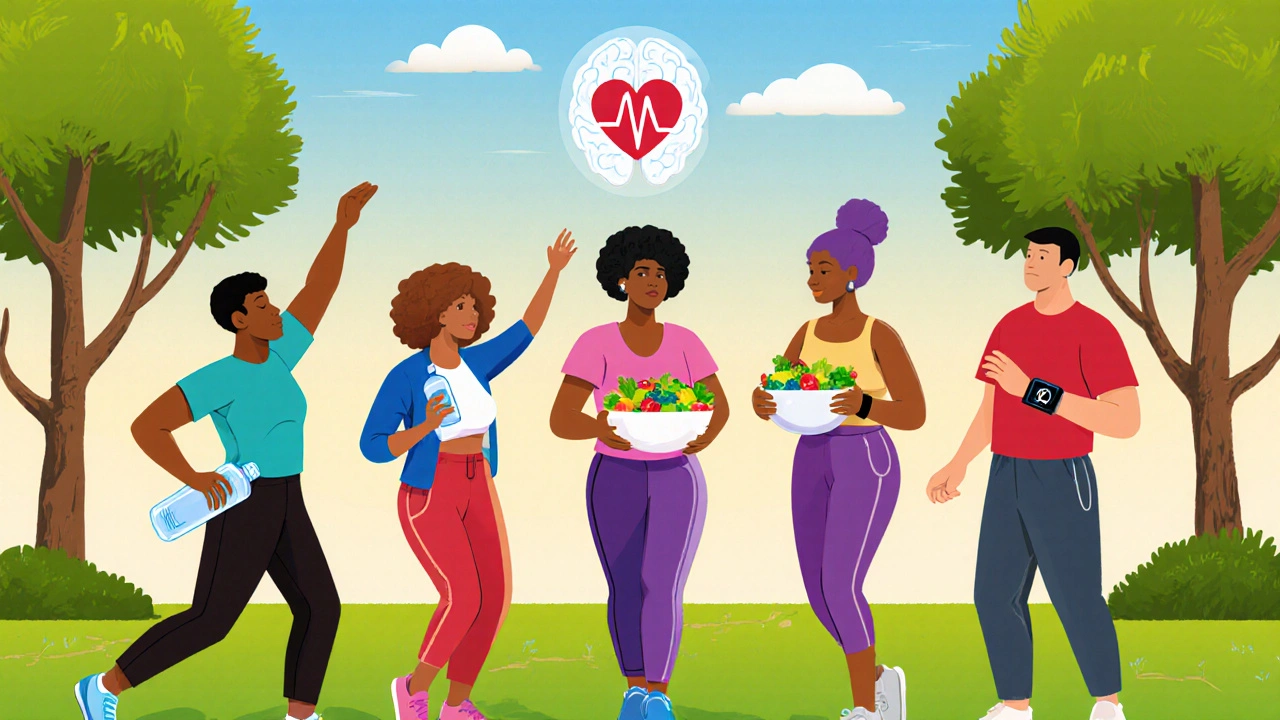MDD Physical Health Risk Calculator
This tool estimates your risk of developing physical health complications related to Major Depressive Disorder based on lifestyle factors. Enter your information below to see your estimated risk level.
Major Depressive Disorder is a mental health condition characterized by persistent low mood, loss of interest, and a range of cognitive and somatic symptoms. It affects roughly 264 million people worldwide and is a leading cause of disability. While the emotional toll is obvious, the physical fallout often flies under the radar. This article unpacks the ways major depressive disorder reaches beyond the mind, touching the heart, metabolism, immune system, and more.
- Depression triples the risk of heart disease.
- People with depression are up to 60% more likely to develop type 2 diabetes.
- Stroke incidence climbs by 30% among those with chronic depressive symptoms.
- Inflammatory markers rise, fueling obesity and chronic pain.
- Targeted lifestyle and treatment strategies can cut these risks dramatically.
How MDD Affects the Body
When you’re stuck in a depressive spiral, your body doesn’t stay still. Hormonal imbalances, especially elevated cortisol, kick in a stress response that lasts far longer than a typical “fight‑or‑flight” episode. This prolonged cortisol surge messes with blood sugar regulation, blood pressure, and the immune system, setting the stage for a cascade of health problems.
Cardiovascular Risks
Heart Disease is the leading cause of death globally, and depression is a major accelerator. Studies from the American Heart Association show that patients diagnosed with depression have a 2‑ to 3‑fold higher chance of experiencing a heart attack or developing coronary artery disease. The link stems from several mechanisms: increased platelet aggregation, higher resting heart rate, and poorer adherence to medication or lifestyle recommendations.
For example, a 2023 longitudinal study of 5,000 adults found that those with persistent depressive symptoms were 45% more likely to develop hypertension within five years, even after adjusting for smoking, diet, and exercise.
Metabolic and Weight Issues
Type 2 Diabetes shares a bidirectional relationship with depression. Depressed individuals often experience changes in appetite-either overeating high‑sugar comfort foods or losing interest in meals altogether. Both scenarios can destabilize glucose control. Moreover, cortisol‑driven insulin resistance makes it harder for the body to process sugar, pushing blood glucose levels upward.
Obesity, another frequent companion of depression, compounds the risk. A 2022 meta‑analysis of 28 studies reported that people with depression had a 58% greater odds of being classified as obese (BMI≥30) compared with non‑depressed peers.
Immune and Inflammatory Pathways
The Immune System isn’t just a defender against infections; it also communicates with the brain. Chronic inflammation, marked by elevated C‑reactive protein (CRP) and interleukin‑6 (IL‑6), is common in depression. These inflammatory messengers can damage blood vessels, exacerbate atherosclerosis, and even alter neurotransmitter function, creating a vicious feedback loop.
Inflammation also fuels Obesity, as inflammatory cytokines interfere with leptin signaling, the hormone that regulates hunger and satiety. The end result is a higher likelihood of metabolic syndrome-a cluster of conditions that dramatically raises cardiovascular risk.

Pain and Sleep Disruptions
Chronic pain conditions such as fibromyalgia and low‑back pain are reported by up to 70% of people with depression. The pain‑depression link is partly neurological: shared pathways involving serotonin and norepinephrine affect both mood and pain perception.
Sleep apnea, another frequent comorbidity, worsens both depression and cardiovascular outcomes. Interrupted breathing leads to nighttime hypoxia, which spikes blood pressure and triggers morning fatigue-fuel for the depressive cycle.
Managing Physical Health While Living with MDD
Knowing the risks is half the battle; the other half is taking actionable steps. Here’s a practical checklist that combines mental‑health treatment with physical‑health safeguards:
- Seek professional help. Antidepressants, especially SSRIs, can improve mood and indirectly reduce physiological stress. For those at high cardiac risk, consider medications with a neutral impact on heart rate.
- Integrate regular activity. Even 20 minutes of brisk walking three times a week improves insulin sensitivity, lowers CRP, and releases endorphins that boost mood.
- Prioritize nutrition. A Mediterranean‑style diet-rich in fruits, vegetables, whole grains, and omega‑3 fatty acids-has been shown to lower depressive symptoms and cardiovascular events.
- Monitor biomarkers. Annual checks of blood pressure, fasting glucose, lipid profile, and CRP can catch early warning signs.
- Address sleep. Cognitive‑behavioral therapy for insomnia (CBT‑I) and, if needed, continuous positive airway pressure (CPAP) for sleep apnea can break the sleep‑depression loop.
- Build a support network. Friends, family, or peer groups provide accountability for exercise, medication adherence, and healthy eating.
When lifestyle changes feel overwhelming, start small. Swap one sugary snack for a piece of fruit, walk to the mailbox instead of driving, or schedule a quick tele‑health visit to discuss medication side‑effects.
Quick Reference Table
| Condition | Relative Risk Increase | Key Mechanism |
|---|---|---|
| Heart Disease | 2‑3× | Platelet aggregation, higher heart rate, poor medication adherence |
| Type 2 Diabetes | 1.5‑2× | Insulin resistance from cortisol, unhealthy eating patterns |
| Stroke | 30% higher | Hypertension, inflammation, atrial fibrillation risk |
| Obesity | 58% greater odds | Leptin resistance, emotional eating, reduced activity |
| Chronic Pain | Up to 70% prevalence | Shared neurotransmitter pathways, heightened pain perception |
Key Takeaways
Depression isn’t just a feeling-it’s a systemic condition that can accelerate heart disease, diabetes, obesity, and chronic pain. By treating the mind and the body together, you can cut those risks dramatically. Simple steps like moving more, eating cleaner, and keeping an eye on blood work can make a world of difference.
Frequently Asked Questions
Can antidepressants worsen physical health problems?
Most modern antidepressants are neutral or even beneficial for heart health. However, some older tricyclics can affect heart rhythm, so discuss options with your doctor, especially if you have existing cardiac issues.
Is exercise really that important for someone with depression?
Yes. Physical activity releases endorphins, improves insulin sensitivity, and lowers inflammatory markers-all of which counteract the physiological effects of depression.
How often should I get blood work done if I have MDD?
At least once a year, or more frequently if you’re on medication that can affect liver function or lipid levels. Include checks for glucose, cholesterol, blood pressure, and CRP.
Does treating depression reduce the chance of developing diabetes?
Evidence suggests that effective depression treatment, combined with lifestyle changes, can lower diabetes incidence by up to 30% compared with untreated depression.
What’s the link between sleep apnea and depression?
Sleep apnea causes intermittent oxygen drops, which raise blood pressure and trigger inflammation-both factors that worsen depressive symptoms. Treating apnea often leads to mood improvement.









Write a comment
Your email address will be restricted to us